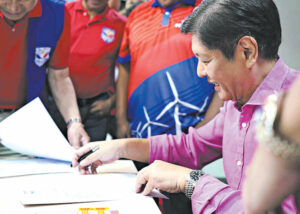Fostering unity in a time of great challenge

Ferdinand “Bongbong” R. Marcos, Jr. will become the 17th President of the Philippines today. Elected on promises of uniting the country, he has planned to make his inauguration a ‘very solemn and simple’ affair with respect to Filipino tradition.
Mr. Marcos has been in the government for over 25 years, having first been elected unopposed to a vice-gubernatorial seat in the 1980s when his father, then President Ferdinand Emmanuel Edralin Marcos, Sr., was still in office. He has since then been in several positions in both the Executive and Legislative branches of government, including a seat in Congress and the Senate. Most notably, he has run for the office of the Vice-President unsuccessfully in 2016.
Before that, Mr. Marcos obtained his kindergarten and elementary education at Institucion Teresiana and La Salle Greenhills in Manila, respectively. He was then sent to England by his parents, where he lived and studied in Worth School, which is an all-boys Benedictine abbey.
He graduated with a Special Diploma in Social Studies from Oxford University in England, before pursuing a Masters in Business Administration in Wharton School of Business, University of Pennsylvania in Philadelphia, USA. He did not finish his Masters, however, as he chose to serve instead as vice-governor of the province of Ilocos Norte in 1981, at a young age of 23. He became governor of the province from 1983 to 1986.
Notably, it was also during his term as governor in Ilocos Norte where he found experience in sustainable energy development, as the region became a pioneer in wind power technology. The wind farms erected in the region still serves to boost power capacity in the Luzon grid in Northern Luzon.
When he returned from exile with his family in 1992, Mr. Marcos then went on to a seat as Congressman in the Second District of Ilocos Norte. In his two terms in office at the House of Representatives, he contributed to the passage of laws that created the Department of Energy and the National Youth Commission.
Mr. Marcos found more success when he served in the Senate, where he was credited in 51 Senate bills in his first three years in office. Those passed into law include the Anti-Drunk and Drugged Driving Act, National Health Insurance Act, and the Cybercrime Prevention Act. During the second half of his term, he contributed to legislation such as the Postponement of the Sangguniang Kabataan Elections, and the Expanded Senior Citizens Act.
A policy of looking forward

Mr. Marcos now comes into the Office of the President amidst a time of great challenge. The country is slowly gearing up for an economic recovery after the impact of the global COVID-19 crisis, but issues such as rising oil prices, quickening inflation rates, as well as the effects of the war in Ukraine, a worldwide food crisis, and climate crisis pose massive risks to its development.
“We have all heard encouraging statements from the incoming economic managers led by outgoing Bangko Sentral governor and incoming Finance chief, Benjamin Diokno, that our new administration will be taking off from sound economic fundamentals,” Mr. Marcos said on his website.
“It will not be an easy road ahead, but we are not without the necessary wherewithal and elbow room to manage the challenges,” he added.
Part of his plan to enable the country’s growth is to build on and strengthen the present momentum created by the Duterte administration, particularly the “Build, Build, Build” infrastructure program. Mr. Marcos pledged to focus on building an economic team that can steer the economy through its current challenges.
“The first priority is always going to be the economy. That’s why we have been very careful in choosing the economic team. It’s still down to jobs, the increasing prices of commodities, some relief for the business community. We have to streamline the operations of government,” Mr. Marcos said.
Mr. Marcos went further to tackle the issue of food shortage head-on, as he announced that he would take over the Agriculture department for the present.
“For agriculture, I think the problem is severe enough that I have decided to take on the portfolio of secretary of Agriculture at least for now,” he said. “At least until we can reorganize the Department of Agriculture in a way that it can be ready for the years to come.”
Mr. Marcos said he would focus on boosting food production amid rising food protectionism around the world. Thailand and Vietnam, where the country primarily imports its rice from, have recently announced that they will be banning rice exports in a bid to raise prices and boost farmer income.
Agriculture contributes about a 10th to the Philippines’ gross domestic product and a fourth of jobs in the country. However, its output has shrank by an annual 0.3% in the first quarter, as fisheries, livestock and crop production declined due to the spike in oil and fertilizer prices after Russia’s invasion of Ukraine in late February. — Bjorn Biel M. Beltran



